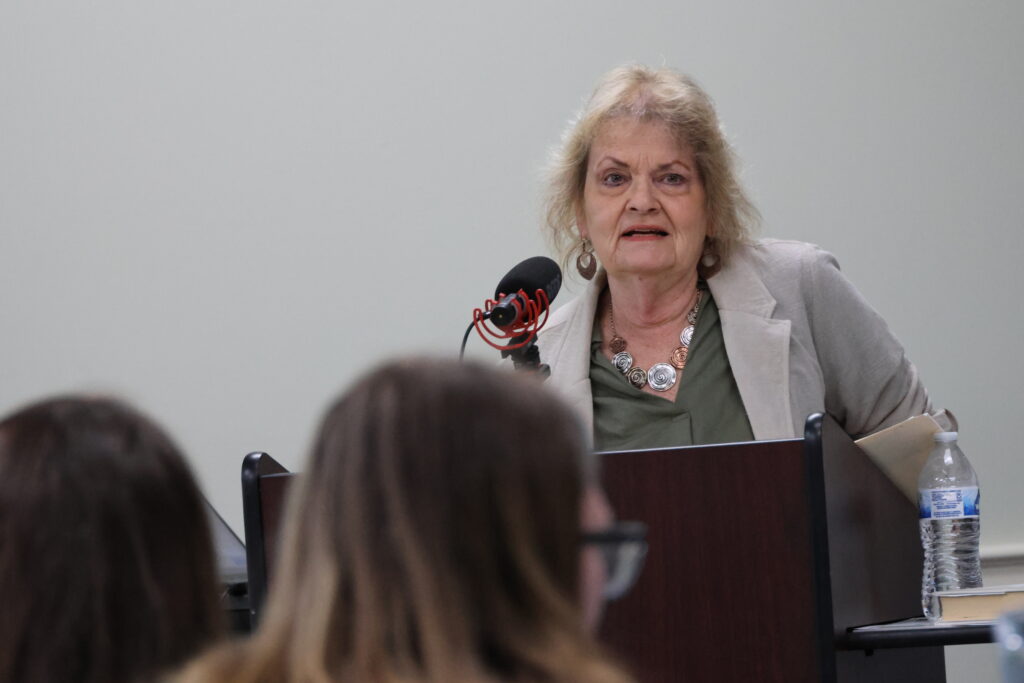Mental Health Symposium: Harm Reduction and Syringe Exchange
Published 4:30 pm Monday, June 10, 2024

- Boyle County ASAP Coordinator Kathy Miles speaks about harm reduction at the symposium. (Photo by Lance Gaither)
May 2024 was Mental Health Awareness Month. Ephraim McDowell Health and the Rotary Club of Danville partnered to host a Mental Health Symposium on May 29 at the Boyle County Library to encourage discussion about mental health in the community.
At the symposium, Boyle County Agency for Substance Abuse Policy Coordinator Kathy Miles spoke about the connection between mental health and substance abuse, along with the importance of harm reduction and the benefits that the needle exchange program provides.
“Think about recovery readiness when it comes to substance abuse and mental health as a puzzle,” Miles said. “A puzzle where you put together what research says and what we know we know in our community. We need to help people be in long-term recovery for mental health and substance use disorders.”
Miles explained that it was in 2015 when the heroin and opioid epidemic reached Boyle County in full force.
“We realized heroin was in Boyle County; that was a hard realization for a lot of people,” Miles said. “Heroin was considered an urban problem and not something we had here, but we did. In 2016 and 2017, we looked at things like overdoses. There was a 10-day period where we had a lot of overdose deaths. It hit Boyle County hard.”
Miles said that the community realized tackling the problem would require a joint effort between law enforcement, medical professionals, treatment professionals, and the community. She went on to say that utilizing individuals on the path of recovery is vital to successful programs.
“You can’t leave the people who have been there out,” Miles said. “You can’t leave people out who have so much to give to the community and are often not allowed to give.”
Miles explained the concept of recovery capital, a relatively new concept in addiction treatment that refers to the resources, support, and opportunities an individual has access to during their recovery journey. Recovery capital encompasses the physical, social, and emotional assets that enable someone to maintain sobriety and overcome addiction.
Recovery capital is crucial for individuals struggling with addiction because it provides a safety net that helps them navigate the challenges of recovery. It includes factors such as access to healthcare, housing, employment, and social connections, which can help reduce stress and increase feelings of well-being. Recovery capital also involves having a supportive network of friends and family members who can offer emotional support and encouragement.
Having adequate recovery capital can significantly improve treatment outcomes and reduce the risk of relapse. Research has shown that individuals with high levels of recovery capital are more likely to remain abstinent and experience improved mental health. On the other hand, individuals with limited recovery capital may be more susceptible to relapse due to a lack of access to resources and support.
“We don’t take anything away from a person’s internal commitment to recovery,” Miles said. “When a community supports their recovery, it makes so much of a difference. Addiction is a treatable disease, but it is a chronic disease; they need help all along the way.”
She explained that Boyle County was Kentucky’s first officially recognized recovery-ready community. A recovery-ready community identifies its needs and creates a plan for improvement.
“We are not perfect,” Miles said. “We still have gaps. We don’t have a residential treatment program in Boyle County. We know that there are other gaps, but we are still dealing with issues with stigma. We still have work to do.”
Harm reduction is a program that utilizes research-based methods of communicating with those struggling with substance use disorders to equip them with life-saving tools and knowledge.
“Everyone has worth,” Miles said, “Even those who are using drugs. They deserve to have help with their life. The phrase used to be, ‘let them hit rock bottom, and they will seek help.’ With the substances out there today, hitting rock bottom means dying.”
In addition to reducing overdose deaths, harm-reduction policies have been proven to reduce the transmission of disease. People can bring used needles to the Syringe Exchange program at the Boyle County Health Department, and get clean needles. This reduces the risk of spreading disease through dirty needles.
“You need to develop relationships that matter,” Miles said. “You would have people coming back to the health department over and over because somebody cared about them and gave them what they needed. Change is a process for everybody.”






